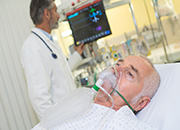- Could Your Grocery Store Meat Be Causing Recurring UTIs?
- Are You Making This Expensive Thermostat Error This Winter?
- Recognizing the Signs of Hypothyroidism
- 10 Strategies to Overcome Insomnia
- Could Artificial Sweeteners Be Aging the Brain Faster?
- Techniques for Soothing Your Nervous System
- Does the Water in Your House Smell Funny? Here’s Why
- Can a Daily Dose of Apple Cider Vinegar Actually Aid Weight Loss?
- 6 Health Beverages That Can Actually Spike Your Blood Sugar
- Treatment Options for Social Anxiety Disorder
For Cancer Patients, Getting COVID-19 Raises Death Risk 16-Fold

COVID-19 is no joke for tens of thousands of ill Americans, but a new report shows just how dangerous it can be for those already fighting cancer.
The study was based on an analysis of the health records of 212,000 people living with cancer. It found that a COVID-19 diagnosis raised a patient’s odds of death 16-fold, compared to cancer patients without the coronavirus.
Cancer patients with COVID-19 were also more likely to have other health issues, such as kidney failure, obesity or heart disease — all of which have also been tied to an increased risk for severe coronavirus illness.
Compared to cancer patients without COVID-19, those with the illness were also more prone to requiring hospitalization and even the need for ventilator assistance to keep them alive, the study found.
The study was conducted at the U.S. Food and Drug Administration’s Oncology Center of Excellence (OCE), and released July 22 at an online meeting of the American Association for Cancer Research.
The data “revealed a stark reality that people with cancer are at an increased risk of more serious outcomes from COVID-19,” said Dr. Harpreet Singh, associate director of Cancer in Older Adults and Special Populations at OCE.
As happens in other areas of health care, income and race also appear to play a role in who fares worse when COVID-19 and cancer combine, she added.
According to the study, “there are inequities for Black Americans and those of lower socioeconomic means,” Singh said in an FDA news release. “It’s imperative that we continue to rapidly examine real-world data to address the urgent health care challenges brought on by this pandemic.”
Preventing infection with the new SARS-CoV-2 coronavirus is the best way to help protect vulnerable cancer patients. Social distancing, frequent hand-washing and use of hand sanitizers, wearing a mask and other everyday precautions can help stop that from happening.
The data used in the study included health records for people living with cancer who were enrolled in one of two major health systems in the Midwestern United States.
Data presented at medical meetings is typically considered preliminary until published in a peer-reviewed journal.
More information
There’s more on the intersection of cancer and COVID-19 at the American Cancer Society.
Source: HealthDay
Copyright © 2026 HealthDay. All rights reserved.










